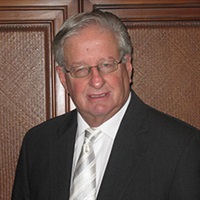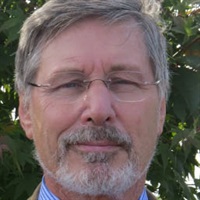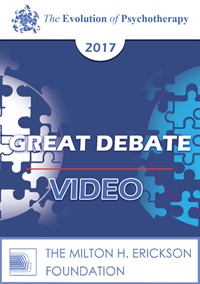EP17 Great Debates 02 - The Neurobiology and Psychosocial Correlates of Trauma and Resilience - Donald Meichenbaum, PhD and Bessel van der Kolk, MD
Credit Available - See Credits tab below.
Total Credits: 1 including 1 A.P.A.
- Average Rating:
- Not yet rated
- Topic Areas:
- Great Debates | Post-Traumatic Stress Disorder (PTSD) | Trauma | Neurobiology | Psychotherapy
- Bundle(s):
- Learning Track - EP17 Trauma Stream
- Categories:
- Evolution of Psychotherapy | Evolution of Psychotherapy 2017 | Evolution of Psychotherapy Trauma Learning Track | Online Continuing Education
- Faculty:
- Donald Meichenbaum, PhD | Bessel van der Kolk, MD
- Course Levels:
- Master Degree or Higher in Health-Related Field
- Duration:
- 1:19:12
- Format:
- Audio and Video
- Original Program Date:
- Dec 14, 2017
- License:
- Never Expires.
Description
Description:
In the aftermath of traumatic and victimizing experiences, most individuals are impacted, but 75% evidence resilience while 25% “get stuck” and develop PTSD and co-occurring disorders. This presentation will discuss what distinguishes these two groups and considers the implications for treatment.
Educational Objectives:
- Distinguish the neuro-biological and psycho-social consequences of trauma and resilience and the implications for treatment.
- Discuss practical ways to bolster resilience in six domains (physical, interpersonal, emotional, cognitive, behavioral, and spiritual).
*Sessions may be edited for content and to preserve confidentiality*
Credits
1 credits available.
The Milton H. Erickson Foundation, Inc. is approved by the American Psychological Association to sponsor continuing education for psychologists. The Milton H. Erickson Foundation, Inc. maintains responsibility for this program and its content.
THE MILTON H. ERICKSON FOUNDATION Policy on Disclosure
The Milton H. Erickson Foundation is proud of the conferences and other
educational opportunities it sponsors, taking care that the conduct of
these activities conforms to the standards and principles of behavioral
and medical sciences, thus ensuring balance, independence, objectivity
and scientific rigor in all individually sponsored or jointly sponsored educational
activities.
All faculty members participating in a sponsored activity, and those who
review and therefore are in control of content, are requested to disclose
any relevant financial relationship prior to the CME activity, including but
not limited to specific commercial interests, financial remuneration received
by faculty member or spouse, and what role or activity was performed
for this remuneration. If a conflict of interest exists as a result of
a financial relationship it will be resolved prior to the activity. A faculty
member will not be allowed to present if the conflict is not or cannot be
resolved.
Faculty

Donald Meichenbaum, PhD Related Seminars and Products
Donald Meichenbaum, Ph.D in Clinical Psychology is currently Research Director of Melissa Institute for Violence Prevention, Miami (melissainstitute.org). He is one of the founders of cognitive behavior therapy. He was voted one of the most influential psychotherapists of the 20th century. Latest books include "Roadmap to Resilience" (www.roadmaptoresilience.com) and "Evolution of Cognitive Behavior Therapy: A Personal and Professional Journey."

Bessel van der Kolk, MD Related Seminars and Products
Bessel A. van der Kolk M.D. has been active as a clinician, researcher and teacher in the area of posttraumatic stress and related phenomena since the 1970s. His work integrates developmental, biological, psychodynamic and interpersonal aspects of the impact of trauma and its treatment. His book Psychological Trauma was the first integrative text on the subject, painting the far ranging impact of trauma on the entire person and the range of therapeutic issues which need to be addressed for recovery.


